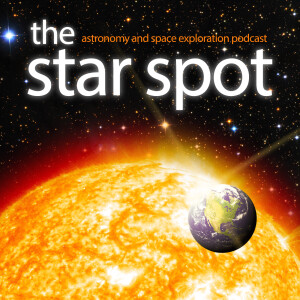
Episode 173: Discovering an Ancient Oasis, with William Rapin
 2019-11-11
2019-11-11
Feature Guest: William Rapin
Welcome to Sutton Island, here in the middle of a beautiful and rugged landscape consisting of shallow lakes filled with salts and minerals. It’s a common vista on this world, and while the world in question is not our home, ancient Mars may well have been someone’s home. Today we’re joined here at The Star Spot by William Rapin, with reports from the latest discoveries of the Mars Curiosity rover and why one of the Principal Investigators of NASA’s Viking mission is now convinced we found life on Mars back in the 1970s,
Current in Space
Amelia and Tony share exciting news: the most powerful radio dish telescope in the world will soon be ready for widespread astronomical use! Then Joseph excites even more with a stunning discovery: the presence of water in the atmosphere of an exoplanet, making it the most prominent target yet in the search for habitable worlds. And once again on the subject of habitable worlds, in her debut, Dunja wonders if the size of planets matters to their potential for being habitable. Finally, Amelia and Priyanka report on a remarkable new technique for estimating the mass of black holes!
About Our Guest
William Rapin is postdoctoral scholar in the Division of Geological and Planetary Sciences at Caltech. His research investigates the surface geochemistry of planets to improve our understanding of their origin, evolution, and habitability. Previously he worked as Research Assistant at NASA Ames Research Centre and was Assistant System Engineer with the Centre National d'Études Spatiales
More Episodes
 2020-01-06
2020-01-06
 2019-09-16
2019-09-16
 2019-08-05
2019-08-05
Create your
podcast in
minutes
- Full-featured podcast site
- Unlimited storage and bandwidth
- Comprehensive podcast stats
- Distribute to Apple Podcasts, Spotify, and more
- Make money with your podcast
It is Free
- Privacy Policy
- Cookie Policy
- Terms of Use
- Consent Preferences
- Copyright © 2015-2024 Podbean.com




